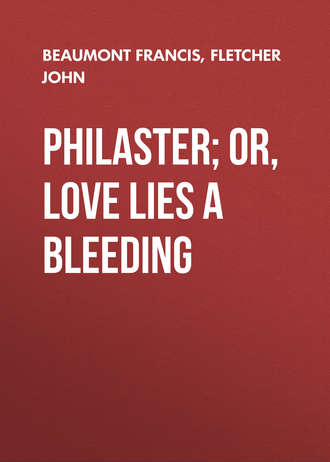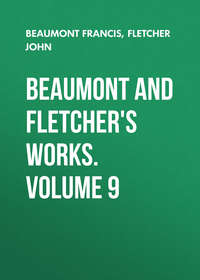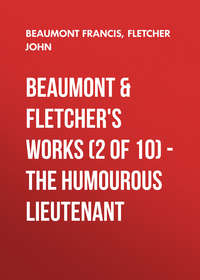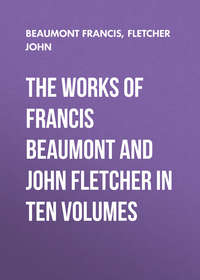 полная версия
полная версияPhilaster; Or, Love Lies a Bleeding
1 Cit. Yes indeed will we Sir, we have not seen one fo[r] a great while.
Capt. He would have weapons would he? give him a Broad-side my brave boyes with your pikes, branch me his skin in Flowers like a Satin, and between every Flower a mortal cut, your Royalty shall ravel, jag him Gentlemen, I'le have him cut to the kell, then down the seames, oh for a whip To make him Galoone-Laces, I'le have a Coach-whip.
Pha. O spare me Gentlemen.Cap. Hold, hold, the man begins to fear and know himself, He shall for this time only be seal'd up With a Feather through his nose, that he may only see Heaven, and think whither he's going, Nay beyond-Sea Sir, we will proclaim you, you would be King Thou tender Heir apparent to a Church-Ale, Thou sleight Prince of single Sarcenet; Thou Royal Ring-tail, fit to fly at nothing But poor mens Poultry, and have every Boy Beat thee from that too with his Bread and Butter.Pha. Gods keep me from these Hell-hounds.2 Cit. Shall's geld him Captain?Cap. No, you shall spare his dowcets my dear Donsels, As you respect the Ladies let them flourish; The curses of a longing woman kill as speedy as a Plague, Boys.1 Cit. I'le have a Leg that's certain.2 Cit. I'le have an Arm.3 Cit. I'le have his Nose, and at mine own charge build a Colledge, and clap't upon the Gate.4 Cit. I'le have his little Gut to string a Kit with, For certainly a Royal Gut will sound like silver.Pha. Would they were in thy belly, and I past my pain once.5 Cit. Good Captain let me have his Liver to feed Ferrets.Cap. Who will have parcels else? speak.Pha. Good gods consider me, I shall be tortur'd.1 Cit. Captain, I'le give you the trimming of your hand-sword, and let me have his Skin to make false Scabbards.
2. He had no horns Sir had he?Cap. No Sir, he's a Pollard, what would'st thou do with horns?Cit. O if he had, I would have made rare Hafts and Whistles of 'em, but his Shin-bones if they be sound shall serve me.
[Enter Philaster.
All. Long live Philaster, the brave Prince Philaster.Phi. I thank you Gentlemen, but why are these Rude weapons brought abroad, to teach your hands Uncivil Trades?Cap. My Royal Rosiclear, We are thy Mirmidons, thy Guard, thy Rorers, And when thy noble body is in durance, Thus do we clap our musty Murrions on, And trace the streets in terrour: Is it peace Thou Mars of men? Is the King sociable, And bids thee live? Art thou above thy foemen, And free as Phoebus? Speak, if not, this stand Of Royal blood shall be abroach, atilt, and run Even to the lees of honour.Phi. Hold and be satisfied, I am my self Free as my thoughts are, by the gods I am.Cap. Art thou the dainty darling of the King? Art thou the Hylas to our Hercules? Do the Lords bow, and the regarded scarlets, Kiss their Gumd-gols, and cry, we are your servants? Is the Court Navigable, and the presence struck With Flags of friendship? if not, we are thy Castle And this man sleeps.Phi. I am what I desire to be, your friend, I am what I was born to be, your Prince.Pha. Sir, there is some humanity in you, You have a noble soul, forget my name, And know my misery, set me safe aboard From these wild Canibals, and as I live, I'le quit this Land for ever: there is nothing, Perpetual prisonment, cold, hunger, sickness Of all sorts, all dangers, and all together The worst company of the worst men, madness, age, To be as many Creatures as a woman, And do as all they do, nay to despair; But I would rather make it a new Nature, And live with all those than endure one hour Amongst these wild Dogs.Phi. I do pity you: Friends discharge your fears, Deliver me the Prince, I'le warrant you I shall be old enough to find my safety.3 Cit. Good Sir take heed he does not hurt you, He's a fierce man I can tell you Sir.Cap. Prince, by your leave I'le have a Sursingle, And Male you like a Hawke.[He stirs.
Phi. Away, away, there is no danger in him: Alas he had rather sleep to shake his fit off. Look you friends, how gently he leads, upon my word He's tame enough, he need[s] no further watching. Good my friends go to your houses and by me have your pardons, and my love, And know there shall be nothing in my power You may deserve, but you shall have your wishes. To give you more thanks were to flatter you, Continue still your love, and for an earnest Drink this.All. Long maist thou live brave Prince, brave Prince, brave Prince.[Exeunt Phi. and Pha.
Cap. Thou art the King of Courtesie: Fall off again my sweet youths, come and every man Trace to his house again, and hang his pewter up, then to The Tavern and bring your wives in Muffes: we will have Musick and the red grape shall make us dance, and rise Boys.
[Exeunt.
Enter King, Are. Gal. Meg. Cle. Dion, Thra. Bellario, and Attendants.
King. Is it appeas'd?Di. Sir, all is quiet as this dead of night, As peaceable as sleep, my Lord Philaster Brings on the Prince himself.King. Kind Gentlemen! I will not break the least word I have given In promise to him, I have heap'd a world Of grief upon his head, which yet I hope To wash away.Enter Philaster and Pharamond.
Cle. My Lord is come.King. My Son! Blest be the time that I have leave to call Such vertue mine; now thou art in mine arms, Me thinks I have a salve unto my breast For all the stings that dwell there, streams of grief That I have wrought thee, and as much of joy That I repent it, issue from mine eyes: Let them appease thee, take thy right; take her, She is thy right too, and forget to urge My vexed soul with that I did before.Phi. Sir, [it is] blotted from my memory, Past and forgotten: For you Prince of Spain, Whom I have thus redeem'd, you have full leave To make an honourable voyage home. And if you would go furnish'd to your Realm With fair provision, I do see a Lady Me thinks would gladly bear you company: How like you this piece?Meg. Sir, he likes it well, For he hath tried it, and found it worth His princely liking; we were ta'ne a bed, I know your meaning, I am not the first That Nature taught to seek a fellow forth: Can shame remain perpetually in me, And not in others? or have Princes salves To cure ill names that meaner people want?Phi. What mean you?Meg. You must get another ship To clear the Princess and the boy together.
Di. How now!Meg. Others took me, and I took her and him At that all women may be ta'ne sometimes: Ship us all four my Lord, we can endure Weather and wind alike.King. Clear thou thy self, or know not me for Father.Are. This earth, How false it is? what means is left for me To clear my self? It lies in your belief, My Lords believe me, and let all things else Struggle together to dishonour me.Bell. O stop your ears great King, that I may speak As freedom would, then I will call this Lady As base as be her actions, hear me Sir, Believe [y]our hated bloud when it rebels Against your reason sooner than this Lady.Meg. By this good light he bears it hansomely.Phi. This Lady? I will sooner trust the wind With Feathers, or the troubled Sea with Pearl, Than her with any thing; believe her not! Why think you, if I did believe her words; I would outlive 'em: honour cannot take Revenge on you, then what were to be known But death?King. Forget her Sir, since all is knit Between us: but I must request of you One favour, and will sadly be denied.Phi. Command what ere it be.King. Swear to be true to what you promise.Phi. By the powers above, Let it not be the death of her or him, And it is granted.
King. Bear away the boy To Torture, I will have her clear'd or buried.Phi. O let me call my words back, worthy Sir, Ask something else, bury my life and right In one poor grave, but do not take away my life and fame at once.King. Away with him, it stands irrevocable.Phi. Turn all your eyes on me, here stands a man The falsest and the basest of this world: Set swords against this breast some honest man, For I have liv'd till I am pitied, My former deeds are hateful, but this last Is pitifull, for I unwillingly Have given the dear preserver of my life[Offers to kill himself.]
Unto his Torture: is it in the power Of flesh and blood, to carry this and live?Are. Dear Sir be patient yet, or stay that hand.King. Sirs, strip that boy.Di. Come Sir, your tender flesh will try your constancie.
Bell. O kill me gentlemen.Di. No, help Sirs.Bell. Will you Torture me?King. Hast there, why stay you?Bell. Then I shall not break my vow, You know just gods, though I discover all.
King. How's that? Will he confess?Di. Sir, so he says.King. Speak then.Bell. Great King if you command This Lord to talk with me alone, my tongue Urg'd by my heart, shall utter all the thoughts My youth hath known, and stranger things than these You hear not often.King. Walk aside with him.Di. Why speak'st thou not?Bell. Know you this face my Lord?Di. No.Bell. Have you not seen it, nor the like?Di. Yes, I have seen the like, but readily I know not where.Bell. I have been often told In Court, of one Euphrasia, a Lady And Daughter to you; betwixt whom and me (They that would flatter my bad face would swear) There was such strange resemblance, that we two Could not be known asunder, drest alike.Di. By Heaven and so there is.Bell. For her fair sake, Who now doth spend the spring time of her life In holy Pilgrimage, move to the King, That I may scape this Torture.Di. But thou speak'st As like Euphrasia as thou dost look, How came it to thy knowledge that she lives in Pilgrimage?Bell. I know it not my Lord, But I have heard it, and do scarce believe it.Di. Oh my shame, is't possible? Draw near, That I may gaze upon thee, art thou she? Or else her Murderer? where wert thou born?Bell. In Siracusa.Di. What's thy name?Bell. Euphrasia. Di. O 'tis just, 'tis she now, I do know thee, Oh that thou hadst died And I had never seen thee nor my shame, How shall I own thee? shall this tongue of mine E're call thee Daughter more?Bell. Would I had died indeed, I wish it too, And so I must have done by vow, e're published What I have told, but that there was no means To hide it longer, yet I joy in this, The Princess is all clear.King. What have you done?Di. All is discovered.Phi. Why then hold you me?Di. All is discovered, pray you let me go. [He offers to stab himself_.]
King. Stay him.Are. What is discovered?Di. Why my shame, it is a woman, let her speak the rest.Phi. How! that again.Di. It is a woman.Phi. Blest be you powers that favour innocence.King. Lay hold upon that Lady.Phi. It is a woman Sir, hark Gentlemen! It is a woman. Arethusa take My soul into thy breast, that would be gone With joy: it is a woman, thou art fair,And vertuous still to ages, in despight of malice.
King. Speak you, where lies his shame?Bell. I am his Daughter.Phi. The Gods are just.Di. I dare accuse none, but before you two The vertue of our age, I bend my knee For mercy.Phi. Take it freely; for I know, Though what thou didst were undiscreetly done, 'Twas meant well.Are. And for me, I have a power to pardon sins as oft As any man has power to wrong me.Cle. Noble and worthy.Phi. But Bellario, (For I must call thee still so) tell me why Thou didst conceal thy Sex, it was a fault, A fault Bellario, though thy other deeds Of truth outweigh'd it: All these Jealousies Had flown to nothing, if thou hadst discovered, What now we know.Bell. My Father would oft speak Your worth and vertue, and as I did grow More and more apprehensive, I did thirst To see the man so rais'd, but yet all this Was but a Maiden longing to be lost As soon as found, till sitting in my window, Printing my thoughts in Lawne, I saw a God I thought (but it was you) enter our Gates, My bloud flew out, and back again as fast As I had puft it forth, and suck't it in Like breath, then was I call'd away in hast To entertain you. Never was a man Heav'd from a Sheep-coat to a Scepter rais'd So high in thoughts as I, you left a kiss Upon these lips then, which I mean to keep From you for ever, I did hear you talk Far above singing; after you were gone, I grew acquainted with my heart, and search'd What stir'd it so, Alas I found it love, Yet far from lust, for could I have but liv'd In presence of you, I had had my end, For this I did delude my noble Father With a feign'd Pilgrimage, and drest my self In habit of a boy, and, for I knew My birth no match for you, I was past hope Of having you. And understanding well That when I made discovery of my Sex, I could not stay with you, I made a vow By all the most religious things a Maid Could call together, never to be known, Whilst there was hope to hide me from mens eyes, For other than I seem'd; that I might ever Abide with you, then sate I by the Fount Where first you took me up.King. Search out a match Within our Kingdom where and when thou wilt, And I will pay thy Dowry, and thy self Wilt well deserve him.Bell. Never Sir will I Marry, it is a thing within my vow, But if I may have leave to serve the Princess, To see the vertues of her Lord and her, I shall have hope to live.Are. I Philaster, Cannot be jealous, though you had a Lady Drest like a Page to serve you, nor will I Suspect her living here: come live with me, Live free, as I do, she that loves my Lord, Curst be the wife that hates her.Phi. I grieve such vertues should be laid in earth Without an Heir; hear me my Royal Father, Wrong not the freedom of our souls so much, To think to take revenge of that base woman, Her malice cannot hurt us: set her free As she was born, saving from shame and sin.King. Set her at liberty, but leave the Court, This is no place for such: you Pharamond Shall have free passage, and a conduct home Worthy so great a Prince, when you come there, Remember 'twas your faults that lost you her, And not my purpos'd will.Pha. I do confess, Renowned Sir.King. Last joyn your hands in one, enjoy Philaster This Kingdom which is yours, and after me What ever I call mine, my blessing on you, All happy hours be at your Marriage joyes, That you may grow your selves over all Lands, And live to see your plenteous branches spring Where ever there is Sun. Let Princes learn By this to rule the passions of their blood, For what Heaven wills, can never be withstood.[Exeunt OmnesPHILASTER
(A) Phylaster. | Or, | Love lyes a Bleeding. | Acted at the Globe by his Majesties Servants. | Written by Francis Baymont and John Fletcher. Gent. | Printed at London for Thomas Walkley, and are to be sold at his | shop at the Eagle and Child, in Brittaines Bursse. 1620.
This edition contains, on the title-page, a wood-cut representing 'The Princes' (The Princess) and 'A Cuntrie Gentellman' seated on the ground, and 'Phielaster' leaving them. See the scene in Act IV (ante, p. 125).
(B) Philaster. | Or, | Love lies a Bleeding. | As it hath beene diverse times Acted, | at the Globe, and Blacke-Friers, by | his Majesties Servants. | Written by Francis Beaumont, and John Fletcher. Gent. | The second Impression, corrected, and | amended. | London, | Printed for Thomas Walkley, and are to | be solde at his shoppe, at the signe of the | Eagle and Childe, in Brittaines Bursse. | 1622.
(C) Philaster, | or | Love lies a Bleeding. | Acted at the Globe, and Blackfriers. By his Majesties Servants. | The Authors being Francis Beaumont, and John Fletcher. | Gentlemen. | The third Impression. | London, | Printed by A.M. for Richard Hawkins, and are to | be sold at his Shop in Chancery-lane, adjoyning | to Sarjeants Inne gate. 1628.
(D) Philaster, | or | Love lies a Bleeding. | Acted at the Globe, and Blackfriers. By his Majesties Servants. | The Authors being Francis Beaumont, and John Fletcher. Gentlemen. | The fourth Impression. | London, | Printed by W.J. for Richard Hawkins, and are to | be sold at his Shop in Chancery-lane, adjoyning | to Sarjeants Inne gate. 1634.
(E) Philaster | or | Love lies a Bleeding. | Acted at the Globe, and Blackfriers. By his Majesties Servants. | The Authors being Francis Beaumont, and John Fletcher. Gent. | The fourth Impression. | London, | Printed by E. Griffin for William Leak, and are to | be sold at his shop in Chancerie Lane neere | the Rowles. 1639.
(F) Philaster: | or, | Love lies a bleeding. | Acted at the Globe, and Blackfriers, By his Majesties Servants. | The Authors being Francis Beaumont, and John Fletcher, Gent. | The fifth Impression. | London: | Printed for William Leake, and are to be sold at his shop at the | Sign of the Crown in Fleetstreet, between the two | Temple Gates. 1652.
This edition contains on the title-page a small device of fleurs-de-lis.
(G) Philaster | or, | Love lies a bleeding. | Acted at the Globe, and Black-friers, By his Majesties Servants. | The Authors being Francis Beaumont, and John Fletcher, Gent. | The fifth Impression. | London: | Printed for William Leake, and are to be sold at his shop at the | signe of the Crown in Fleet street, between the two | Temple Gates. 1652.
On the back of the title-page (which contains the device of a crown) is a list of books printed or sold by William Leake. (H) Philaster | or, | Love lies a Bleeding: | Acted at the Globe, and Blackfriers, By his Majesties servants. | The Authors being Francis Beaumont, and John Fletcher, Gent. | The sixth Impression. | London, | Printed for William Leake, and are to be sold at his shop at the | signe of the Crown in Fleet street, between the two | Temple Gates.
This edition, conjecturally dated 1660 in the British Museum Catalogue, contains, on the back of the title-page and at the foot of the list of persons represented, lists of books printed or sold by William Leake at the Crown in Fleet Street.
A The first few pages and the last few pages of the play as printed in A vary so completely from the other texts that it has been necessary to print them separately. See post, pp. 401—3, 413—17.
B contains the following Address to the Reader:
'To the Reader.
'Courteous Reader. Philaster, and Anthusa his love, have laine so long a bleeding, by reason of some dangerous and gaping wounds, which they received in the first Impression, that it is wondered how they could goe abroad so long, or travaile so farre as they have done. Although they were hurt neither by me, nor the Printer; yet I knowing and finding by experience, how many well-wishers they have abroad, have adventured to bind up their wounds, & to enable them to visite upon better tearmes, such friends of theirs, as were pleased to take knowledge of them, so mained [? maimed] and deformed, as they at the first were; and if they were then gracious in your sight, assuredly they will now finde double favour, being reformed, and set forth suteable, to their birth, and breeding.
By your serviceable Friend,Thomas Walkley.'C prefixes to the play the following Address repeated with variations of spelling in the five later quartos:
'The Stationer, To the Understanding Gentrie.
'This play so affectionatly taken, and approoved by the Seeing Auditors, or Hearing Spectators, (of which sort, I take, or conceive you to bee the greatest part) hath received (as appeares by the copious vent of two [D and E three; F, G and H four] Editions,) no lesse acceptance with improovement of you likewise the Readers, albeit the first Impression swarm'd with Errors, prooving it selfe like pure Gold, which the more it hath beene tried and refined, the better is esteemed; the best Poems of this kind, in the first presentation, resemble [D—H resembling] that all tempting Minerall newly digged up, the Actors being onely the labouring Miners, but you the skilfull Triers and Refiners: Now considering [D—H consider] how currant this hath passed, under the infallible stampe of your judicious censure, and applause, and (like a gainefull Office in this Age) eagerly sought for, not onely by those that have heard & seene it, [F—H omit heard and] but by others that have meerely heard thereof: here you behold me acting the Merchant-adventurers part, yet as well for their satisfaction, as mine owne benefit, and if my hopes (which I hope, shall never lye like this LOVE A BLEEDING,) doe fairely arrive at their intended Haven, I shall then be ready to lade a new Bottome, and [D—H omit and] set foorth againe, to game the good-will both of you and them. To whom respectively I convey this hearty greeting: ADIEU.'









